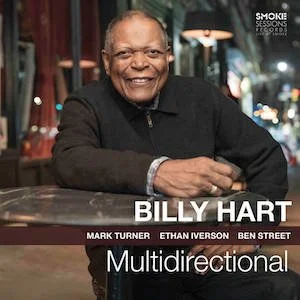Label: Smoke Jazz Sessions Records, 2025
Personnel - Mark Turner: tenor saxophone; Ethan Iverson: piano; Ben Street: bass; Billy Hart: drums.
Serving as a celebration of his upcoming 85th birthday (November 29), the incomparable master drummer Billy Hart—whose musical sensibilities continually surprise regardless of context—releases his first live album with his esteemed quartet: tenorist Mark Turner, pianist Ethan Iverson, and bassist Ben Street. Multidirectional was recorded at NYC’s Smoke Jazz Club, featuring previously recorded material—including originals from three members of the quartet and a cover—that gains fascinating new perspectives and colors in an ode to both discipline and freedom.
Hart’s “Song For Balkis”, written for his daughter and originally included on the album All Our Reasons (ECM, 2012), begins with the drummer’s tom-tom prowess before shaping into a lyrical tone poem. Under the spell cast by the rhythm section, Turner unfolds a logical narrative, followed by a solo piano moment in which Iverson induces placid, dreamlike states with a sky-falling sequence of notes. The mood darkens slightly, and Turner returns with another inspired improvisational discourse. The piece is subtly reconfigured at the end with sophisticated, classical-leaning alignments. Hart also brings “Amethyst” to the lineup, taking a rubato, balladic orientation from the outset before crossing into abstract modal jazz and avant-garde territories, with Turner leading the charge. Iverson responds astutely over a stirring bass-and-drums chain.
The group drives listeners to many unexpected places, and their take on Coltrane’s classic “Giant Steps” is another prime example. Iverson’s intriguing introduction signals that they intend to approach the tune from a new angle—and they do. The dancing groove created by Street and Hart can either hold in pedal points or swing forward, and Iverson’s motivic structures and outro are remarkable.
Turner and Iverson each contribute a composition. The saxophonist wrote “Sonnet For Stevie” for Stevie Wonder, and the quartet’s rendition of this 2013 piece delights both collectively and through each individual statement, swinging and grooving with its own distinctive character. The pianist’s “Shoedown”—the opening piece of the quartet’s previous album Just (ECM, 2022)—is a strikingly beautiful ballad played at a comfortable tempo, with everyone performing from a place of deep conviction.
With musicianship running in their veins, the Billy Hart Quartet radiates elegance and wisdom at every turn. The drummer’s vital energy, unconventional technique, and refined taste remain nothing short of awe-inspiring.
Favorite Tracks:
02 - Giant Steps ► 03 - Sonnet For Stevie ► 04 - Amethyst












